
Tell us what you need to find a matching loft conversion specialist

Get free quotes from professionals near you

Compare offers and choose the one that best matches your need
- Householdquotes.co.uk
- Driveway
- Driveway Materials
- Concrete Driveway
Is Concrete the Best Material for Your New Driveway?

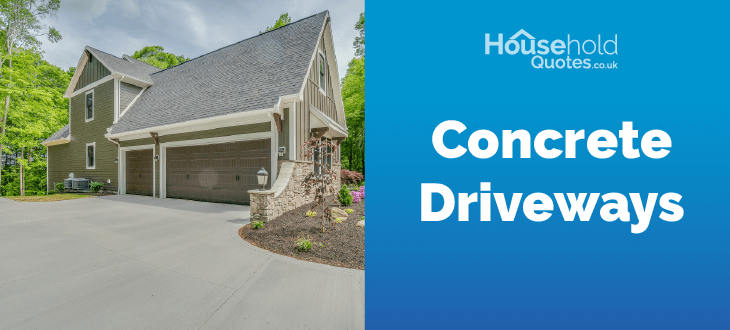
- The average concrete driveway cost is £3,750 for a 2-car driveway 30m2.
- Concrete is one of the strongest materials in the world. It is used to construct driveways, bridges, and buildings. As a result, it is one of the best driveway materials available, as it is long-lasting and sturdy.
- When pouring concrete into your driveway, ensure it is at least 4 inches thick to prevent cracking due to the weight of your cars.
When choosing the best driveway material, it's essential to select one that not only adds to the functionality and longevity of your property but also enhances its aesthetic appeal.
Among the popular options, concrete stands out for its durability, versatility, and low maintenance requirements. However, before deciding, it's essential to evaluate the advantages and disadvantages of concrete driveways compared to other materials.
This article aims to provide an in-depth analysis of whether concrete is the best choice for your new driveway. We'll explore the benefits and drawbacks of concrete driveways, discuss the available types, and provide insights into the costs.
By the end of this article, you'll be equipped with all the information you need to make an informed decision that's right for your specific needs.
Are you considering a new concrete driveway? Finding a skilled and reliable driveway installer who understands your needs can be daunting. You may waste time and energy comparing multiple quotes, hoping to find the best installer at the best rate.
But you don't have to do it alone. Household Quotes is here to help. We're committed to providing excellent support to help you make an informed decision. We can connect you with trusted and local driveway installers who meet your specific needs and requirements.
Say goodbye to the hassle of finding the right installer. Fill out our 30-second form, and we'll provide you with four free quotes as soon as possible. Don't hesitate to click below to learn how we can help you create your perfect driveway.
- Describe your needs
- Get free quotes
- Choose the best offer
It only takes 30 seconds

Concrete driveway: what is it and how much does it cost?
Concrete is a popular and widely used construction material worldwide, with over 20 billion tonnes of it being used every year, according to EKA Cement.
Concrete driveways, composed of cement, water, and aggregates such as gravel or crushed stone, provide exceptional strength and resilience against heavy loads, weather elements, and everyday wear and tear.
The ratio of cement, water, air, and aggregates in the concrete mixture determines its strength. A grading system for concrete reflects this ratio to indicate its strength.
Here are the grades available in the UK and their respective uses:
- C10: Used for patios and slabs
- C15: Used for pavements, kerbs and floor binding
- C20: Domestic floors and foundations, garages, driveways and internal floor slabs
- C25:Multi-purpose concrete mix, usually used for foundations.
- C30: Used for pathways and roads
- C35: Used to create external walls, slabs and structural piling
- C40: Used to create foundations and beams for structural support and roads.
The best concrete mix for driveways is C30 grade concrete, which is more weather-resistant and durable than C20 or C25. According to Mister Concrete, the average cost of C30 concrete is between £110 to £115 per m3.
However, if you are working with a driveway specialist, the cost of C30 concrete should not be a major concern as it will be included in the overall construction cost.
Cost of a concrete driveway
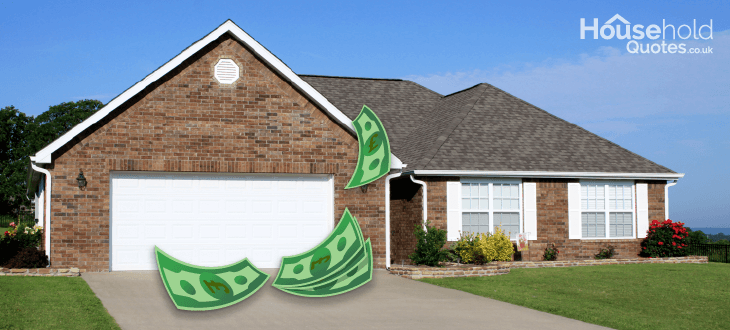
On average, constructing a 30m2 concrete driveway in the UK costs around £3,750. Using other materials, such as pavers or resin, on a 2-car driveway would cost anywhere between £6,000 to £6,700.
This is why concrete is an excellent budget driveway idea that offers many benefits, such as durability and longevity. The cost of these driveways depends on various factors, such as its size, the quality of the concrete used, and the complexity of the design.
Flat-poured concrete driveways are the most economical option, with material costs ranging from £18 to £24 per m2. Their affordability is due to the quick and straightforward installation process, which reduces labour costs.
On the other hand, stamped concrete is a more expensive option, according to Checkatrade, and it can cost around £80 per m2.
The cost of materials remains the same, but the unique pattern that needs to be pressed into the driveway takes longer to install, increasing the labour cost.
Considering your driveway's size, the concrete's quality and the type of driveway you choose is essential when planning and budgeting for your new driveway.
Furthermore, you need to consider the long-term costs of concrete. While regular upkeep may be time-consuming, if a concrete driveway is left unsealed or unmaintained, it can create costly damage such as cracks or potholes.
The driveway repair cost of concrete ranges from £70 to £165 per m2, depending on the concrete you choose. Imprinted pattern concrete will be more expensive to repair, whereas simple flat-poured concrete will be slightly cheaper.
Pros and cons of concrete driveways
Concrete is a good choice for driveways as it offers several advantages while being budget-friendly. However, it is essential to understand the drawbacks of concrete to ensure you make an informed decision. Below, we have listed the pros and cons of concrete driveways and compared them to other popular types of driveway materials:
- Affordable: Concrete is one of the most budget-friendly driveway materials available and is cheaper than resin, cobblestone or natural stone pavers.
- Durable: Concrete can last up to 50 years, making it a cost-effective investment for high-traffic areas.It is one of the strongest materials available for driveways and unlike resin driveways which can lift or crack due to excessive usage, concrete can withstand heavy pressure without any damage.
- Low maintenance: Concrete driveways require less maintenance, with occasional cleaning and resealing to prolong their lifespan and maintain their appearance. While other driveway types, such as cobblestone or gravel require much more maintenance as weeds can grow through their gaps. If you are looking for a low-maintenance driveway, concrete is your best option.
- Versatile: Customising the appearance of your driveway to match your aesthetic preferences is easy with concrete. You can opt for imprinted concrete, aggregate concrete or choose a different colour to mimic the appearance of pricier materials such as stone or brick pavers but half the cost.
- Heat resistant: Concrete is heat resistant which means it is unlikely to crack or melt when exposed to heat unlike other driveway materials such as asphalt or tarmac which can melt during hotter temperatures.
- Smooth surface: The smooth surface of a concrete driveway is ideal for those using mobility aids, as it reduces the risk of tripping or falling compared to driveways such as gravel or cobblestone which has loose stone or large gaps that can make it difficult to move around if using a mobility aid.
- Affected by freeze-thaw cycles: Water can penetrate unsealed concrete, resulting in cracks during the colder months when the water freezes and expands. If you live in a colder climate, it’s important to reseal your concrete driveway. If you want to avoid resealing, you should opt for a weather-resistant gravel driveway.
- Difficult to repair: Repairing extensive damage and large cracks in a concrete driveway can be challenging. Unlike asphalt driveways where a portion of the damaged driveway can be removed, experts recommend replacing the entire driveway if it is not maintained correctly.
- Prone to stains: Concrete’s light colour makes it susceptible to stains and discolouration. Without maintenance, your driveway can appear dirty.
Before choosing a concrete driveway, you should carefully consider the pros and cons and other factors such as your budget, aesthetic preferences, and the area's expected usage and climate conditions. This will ensure that you choose a suitable driveway material that aligns with your needs and priorities.
The best types of concrete driveways
The best types of driveways need to reflect your needs and preferences. For concrete, there are several types of driveways that you can choose from which may suit your needs and preferences such as:
- Flat-poured concrete
- Imprinted concrete
- Aggregate concrete
- Coloured concrete
Flat-poured concrete driveways offer durability and affordability, making them popular with many homeowners. Exposure aggregate concrete driveways add an aesthetic dimension with various decorative options and enhanced slip resistance.
Imprinted concrete driveways provide versatility. They mimic the look of pricier materials like brick or stone while offering the durability of concrete.
Ultimately, the best type of concrete driveway varies based on budget, desired aesthetics, and practical requirements, ensuring a tailored solution that meets your unique needs.
Below, we further detail the best concrete driveways in the UK.
Flat-poured concrete driveway
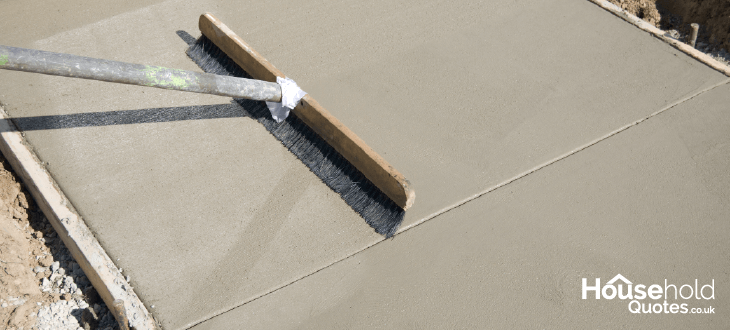
Flat-poured concrete driveways are a popular and affordable option for those of you looking for a durable and modern-looking driveway.
Concrete is poured directly onto a prepared subgrade to create a flat, level surface with minimal decorative features. While it may lack the decorative appeal of other driveways, it offers simplicity and functionality.
It can withstand heavy loads and harsh weather conditions. It is versatile and can fit various architectural styles and landscaping designs.
With proper installation and maintenance, flat-poured concrete can last for many years, making them a practical and long-term solution for homeowners who prefer a straightforward, reliable paving option.
Imprinted concrete driveway
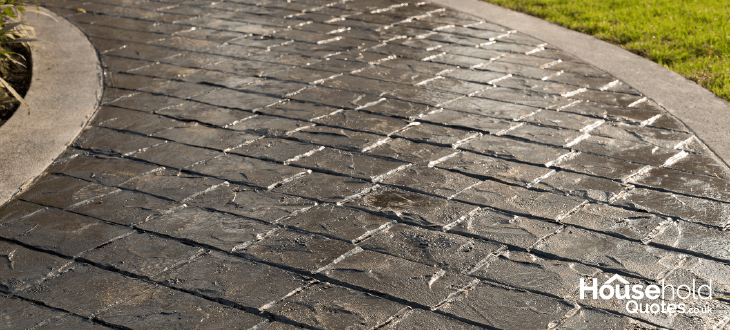
Imprinted or stamped concrete resembles flat-poured concrete in the initial stages of installation. After pouring the wet concrete, it is pressed or stamped into a pattern, making it look like bricks or blocks.
Stamped concrete requires more labour to create the pattern than simple flat-poured concrete. Therefore, it is slightly more expensive, costing an average of around £3,800, according to MyJobQuote, yet it is cheaper than block paving, which averages around £5,500 for a two-car driveway.
It is more cost-effective than paving as the time it takes to install an imprinted driveway is less than the time it takes to install block paving which reduces labour costs.
Pattern-imprinted concrete has several benefits. It not only gives a unique aesthetic appeal to your home, enhancing its curb appeal, but it also has all the advantages of traditional flat-poured concrete, such as durability, longevity, and weather resistance.
If you want to create a unique look for your driveway on a budget, imprinted concrete is your best choice.
Aggregate concrete driveway
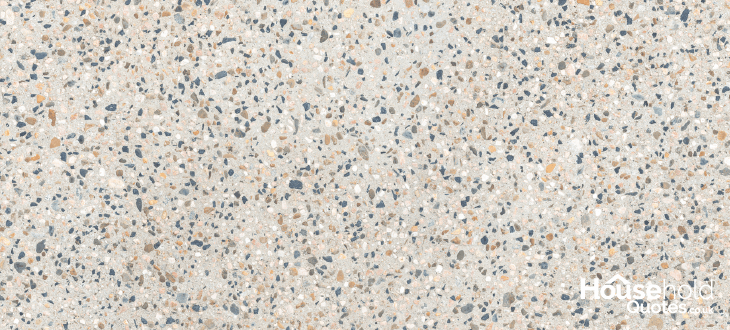
Aggregate concrete driveways are a great way to enhance the appearance of your home. They provide a textured and decorative surface displaying small stones, sand, or gravel, creating a more natural feel than traditional flat-poured concrete.
There are two methods for making aggregate concrete. The first involves adding the aggregates during the mixture, giving the driveway a more uniform look. The second method involves spreading the aggregates on top of the wet concrete once it has been poured.
Apart from the aesthetic appeal, aggregate concrete driveways also offer excellent traction, which can reduce the risk of falls during colder months.
The driveway's textured surface also supports those using mobility aids, as adding aggregates allows for better grip. Furthermore, you can opt for recycled materials in aggregate driveways, making it a more eco-friendly alternative to other types of driveways.
Coloured concrete driveway
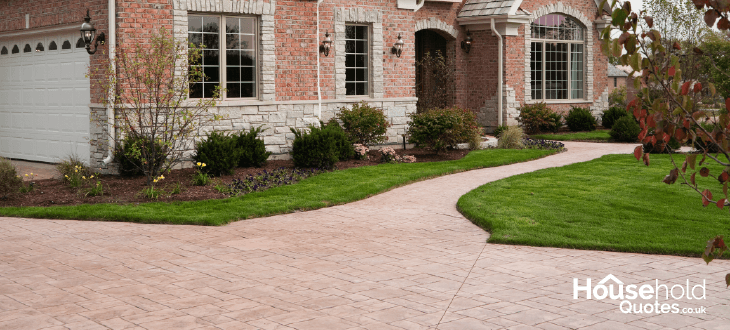
If you want to create an attractive and unique entryway to your home while keeping the sleek finish of flat-poured concrete, then using coloured concrete would be the best solution.
Adding pigments or dyes into the concrete mix during installation can achieve various colours, from earthy tones to vibrant hues. This allows for endless design possibilities, and you can create a driveway that fits into the aesthetic of your home on a budget.
Coloured concrete can emulate the appearance of more expensive materials like brick or natural stone while retaining concrete's durability and low maintenance. Moreover, using coloured concrete can further enhance imprinted concrete.
Even though the initial cost may be slightly higher than standard concrete, the aesthetic appeal and customisation options make coloured concrete driveways a popular choice for those of you seeking to elevate your property's curb appeal.
Can you DIY a concrete driveway?
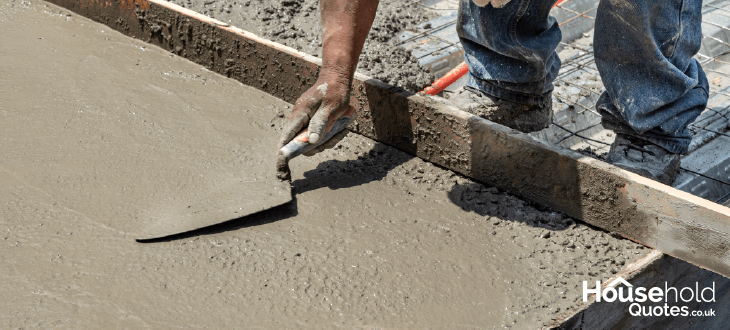
DIY-ing a concrete driveway is possible but requires skills, tools, and patience. The process involves site preparation, forming, mixing, pouring the concrete, and finishing. Here is a step-by-step process of laying a concrete driveway:
- Marking the driveway shape with wooden sticks
- Adding wooden planks to contain the poured concrete
- Digging out the topsoil
- Levelling the driveway
- Adding the sub-base to distribute weight evenly
- Pouring the concrete in evenly. The concrete poured must be 4 to 6 inches thick; any thinner will result in cracking.
- Flattening and grooving the concrete with a concrete grooving tool
- Use a thick-bristled broom to create a non-slip surface.
- Curing the concrete to prevent water from evaporating which will take 7 to 10 days to cure fully.
While most DIY projects save money, concrete installation requires many tools you may not have access to, such as a cement mixer, mini-digger and concrete floats, which will increase expenses. Furthermore, poorly installed concrete can lead to costly damages such as cracks and potholes.
As a result, DIYing a concrete driveway is not recommended. Professional installers have the expertise, knowledge, and tools to ensure a high standard and minimise the risk of mistakes.
They can properly prepare the site, calculate the correct concrete mix ratios, and execute the installation process. Professional installers offer you peace of mind with warranties or guarantees. Hiring a professional driveway installer is the preferred choice for ensuring a durable and professionally finished result.
We understand that finding a reliable driveway installer at Household Quotes can be time-consuming and stressful.
That's why we offer a simple solution: fill out our 30-second form, and we will provide you with four free non-binding quotes from trusted driveway installers who meet your specific needs, preferences, and budget.
Don't settle for a subpar driveway installation. Click below to get started and enjoy a durable and professionally finished result.
- Describe your needs
- Get free quotes
- Choose the best offer
It only takes 30 seconds

FAQ
A concrete driveway is a good idea, especially if you’re on a budget. It is one of the strongest materials available for driveways, which makes it a long-lasting and durable choice. Not only is it initially cost-effective, but it also saves on long-term costs due to its durability.
The average cost of a 30m2 concrete driveway in the UK is around £3,750. However, costs can vary depending on the size of your driveway, the complexity of the design you choose and the quality of the concrete used.
Concrete driveways must be at least 4 inches thick to support car and foot traffic without cracking over time. The recommended thickness is between 4 and 6 inches.
Imprinted concrete is less expensive than paving because it takes less installation time, reducing labour costs. On average, an imprinted concrete driveway will cost £3,800, whereas block paving will cost £5,500.

Caoimhe is an experienced content writer and researcher who is passionate about providing accessible information to every reader. With a background in English literature and Sociology, she combines the two disciplines to create cohesive, well-thought-out, and well-informed pieces.
